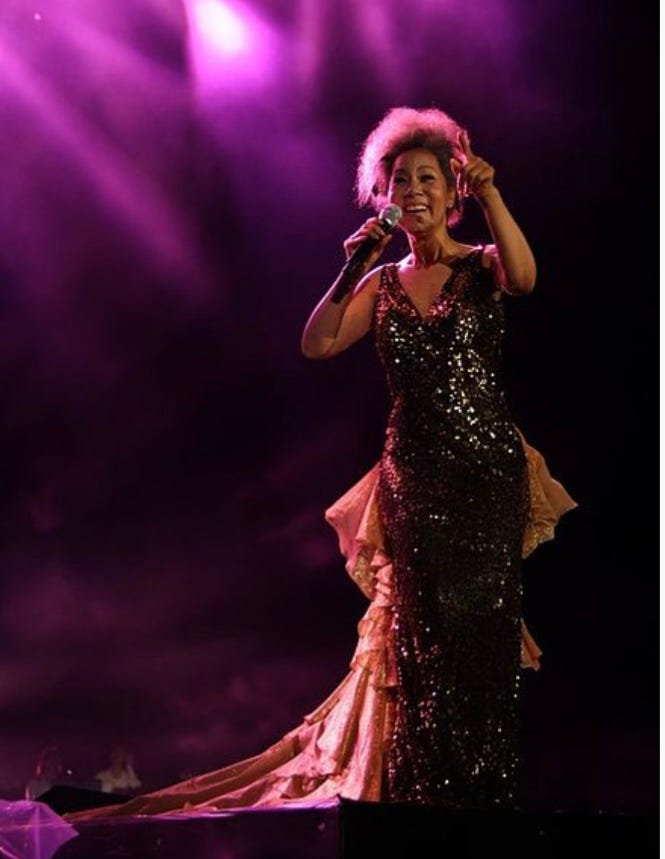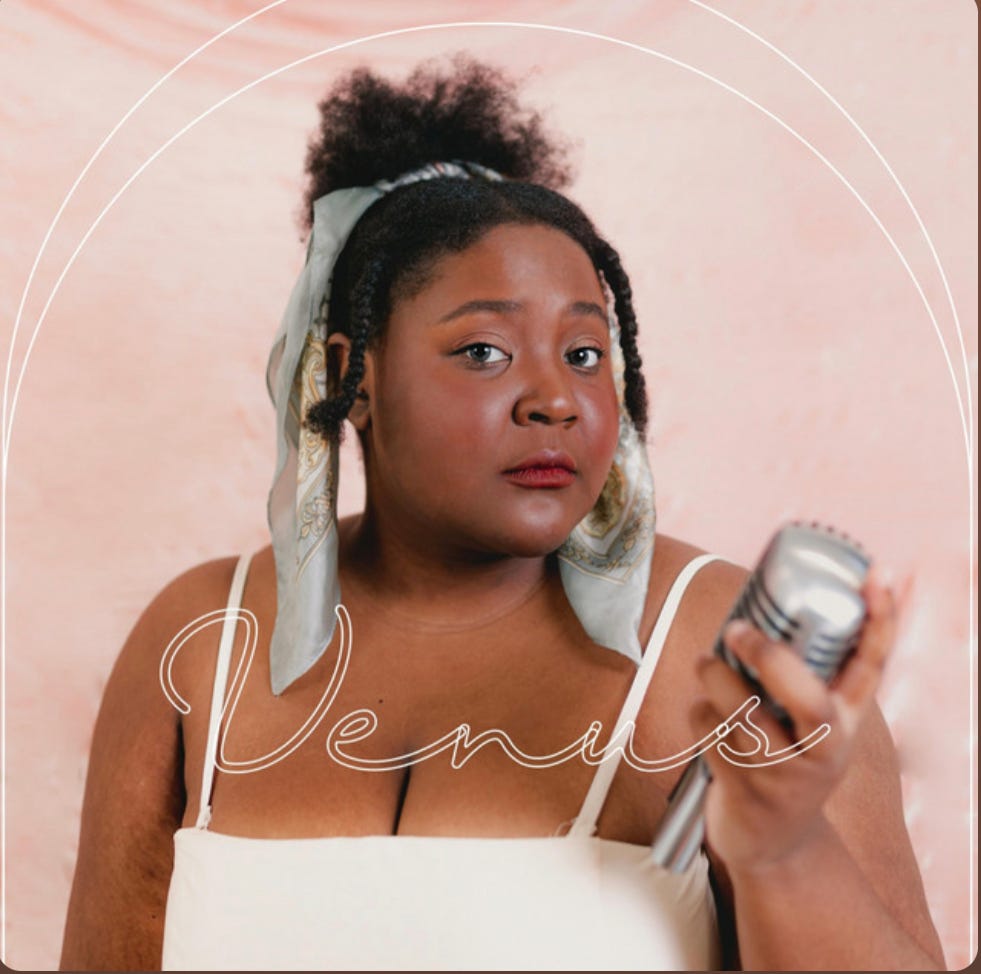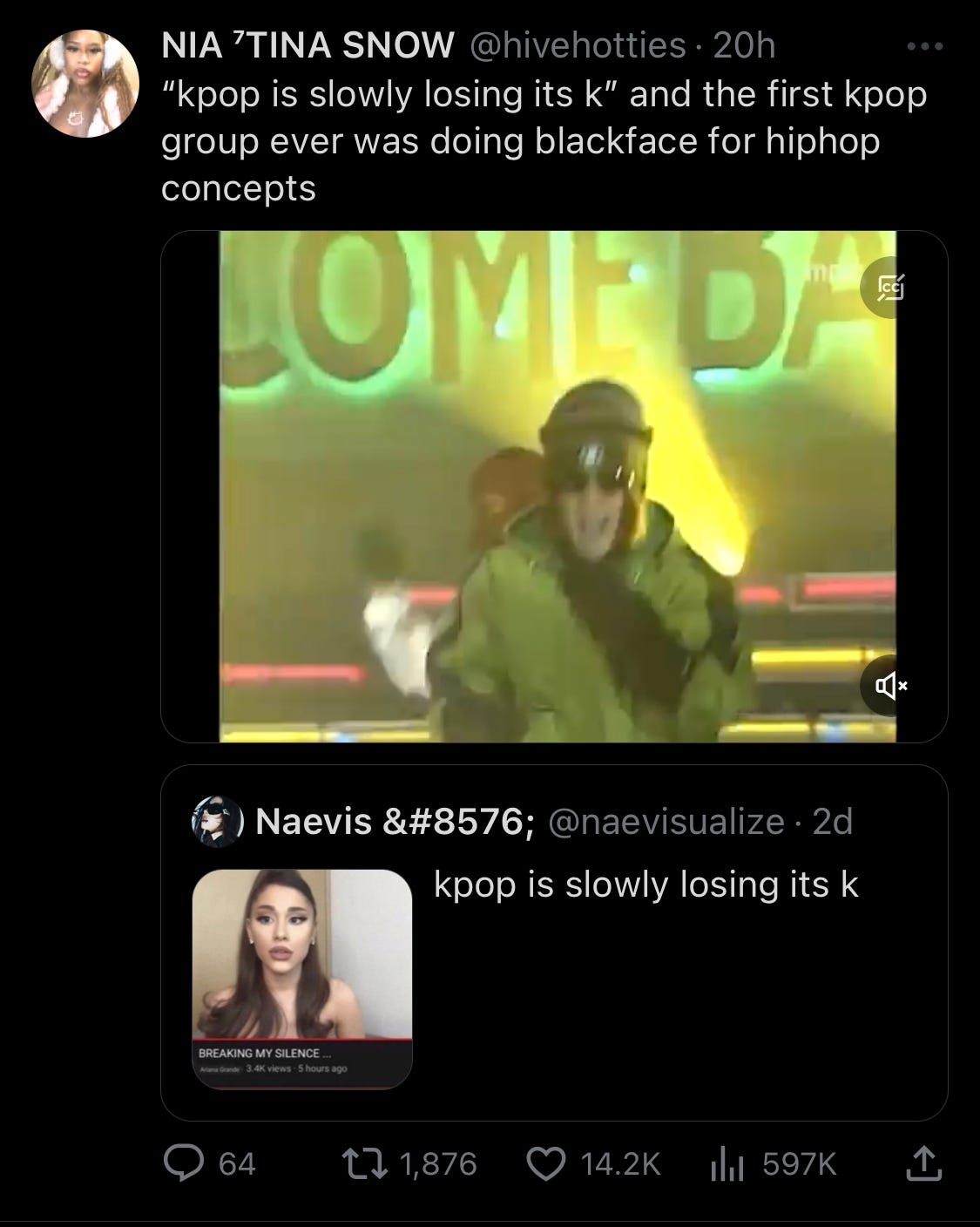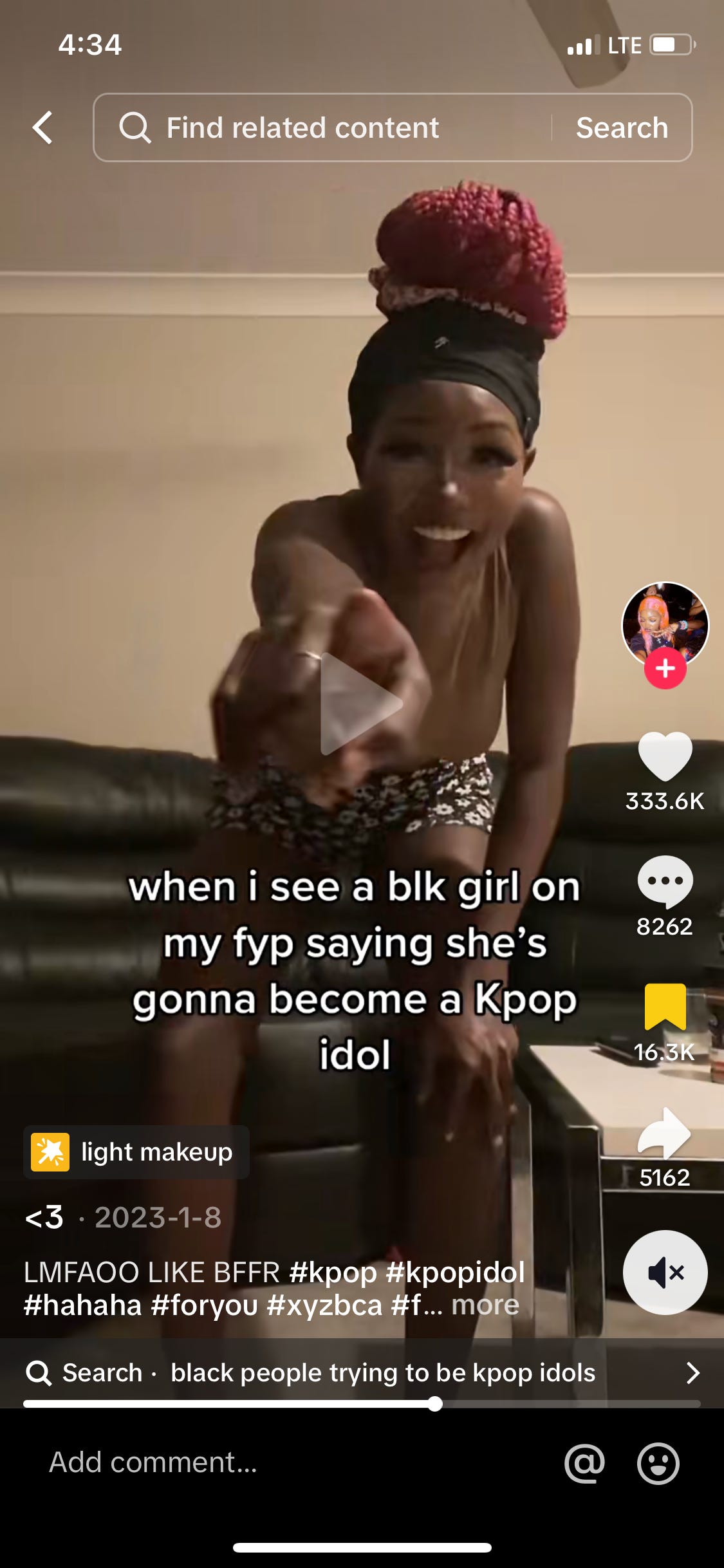Pre-Debut
After all the blood, sweat and tears, you’ve finally made it. Bright stage lights wash over you and bring warmth with their glow as the audience beckons you, cheering in anticipation. You’re in head-to-toe Blumarine, hair and makeup done to perfection. Take it all in. This is your life now.

This is the dream of many young, doe-eyed K-Pop stans. K-Pop, despite having Korean in the name, appeals to an extremely diverse audience. The fandom can become so intense that some people spend their free time training: perfecting difficult choreography, singing along to their favorite songs, learning the Korean language, very earnestly working towards the goal of being up on that stage.
I became particularly fascinated with fat Black girls who are aspiring K-Pop idols*. Scroll through the comments of a plus-sized Black girl with K-Pop dreams, and you’ll see a large amount of people calling her various strains of “delulu”. But what exactly does that mean?
*In this article, I use the terms “fat” and “plus-sized” to describe the same general body shape. Please note that I do not use “fat” in a derogatory way, moreso an objective one. I know that this may make some uncomfortable, but I think it’s important for us to stop treating “fat” like it’s a bad or scary word.
Intro to Delulu
“Delulu” is short for delusional. It has become mainstream and is no longer generally associated with K-Pop, but the term got its start there. “Delulu” would be thrown at people who swore that an idol looked directly at them while onstage in front of a crowd of hundreds of thousands of people, fans who imagined themselves in a relationship with their favorite member (or “bias”) of a group, and so on. It also became common to use the term referring to oneself in a self-aware, tongue-in-cheek manner: fans could say they were “allowing themself to be delulu” while watching a compilation of their bias’s flirtiest moments.
The latter example interests me the most because it shows a direct link to personal passion and delulu behavior. Wording it as though it’s an indulgent treat to be doled out in small quantities. To allow yourself the pleasure to be delulu, because delulu-ness (apparently) is something that must be closely monitored, lest you become one of the truly delusional. But what about people who cross the imagined threshold?
The Philosophy of Being Delusional
In Madness and Civilization: A History of Insanity in the Age of Reason, philosopher Michel Foucault dedicates a whole chapter to the relationship between passion and delirium. He clarifies that “Imagination is not madness. Even if in the arbitrariness of hallucination, alienation finds the first access to its vain liberty” and that “madness begins only beyond this point, when the mind binds itself to this arbitrariness and becomes a prisoner of this apparent liberty”. So: the act of dreaming is not madness, though some K-Pop online spaces would beg to differ. According to Foucault, the best way to keep mad (or delulu) behavior at bay is to remember that it’s just that: a dream.
Foucault continues to say, “Madness is thus beyond imagination and yet it is profoundly rooted in it; for it consists merely in allowing the image a spontaneous value, total and absolute truth”. Madness can’t exist without imagination and vice versa: imagination exists as it is, a fantasy, until it is enticed by the allure of madness to create a false reality. The mind gives power to the image and, for the particularly delulu, begins to build a world around it.
There is something oddly sweet to me about this. I completely understand what it's like to be enamored with the world of your dreams, to gladly take the hand and follow it into the murky waters of delusion. There is a bit of madness and passion in everyone, and Foucault even says earlier in this chapter that “The possibility of madness is therefore implicit in the very phenomenon of passion”. If you’re a K-Pop stan who has been endowed with such (blessing or curse, you decide) powerful intersection of passion and imagination, why not use it to imagine yourself crushing choreography in a designer outfit in front of fans and fellow idols? Why not let this transcend into the real world and upload your dances to social media? Well, in that case, the comments would be more than happy to give you a reality check.
The Backlash
Putting yourself out there is intimidating in and of itself, but the “stan” side of the internet can be especially brutal. People who even joke about becoming a K-Pop idol can be met with some hostility, but the ones who are actually trying to do it face the most backlash. This is particularly true for the plus-sized Black girls. It seems like no matter how well they dance or sing or how talented they actually are, they’ve violated a rule in the unwritten Fandom Social Code just by suggesting that they could actually make it in the K-Pop world.
One TikTok specifically mocking Black girls who want to be K-Pop idols has over 333k likes. The video is a Black girl pointing and laughing hysterically at the idea. Comments range from people joining in on the mockery, trying to be “realistic”, and a few coming to the defense:
“They’re always like 25 and can hardly sing”
“Listen even if u could…why would you want to”
“i saw this girl who’s literally plus size and black and i was like babe at some point we have to be fr”
Another TikTok with 46K likes is a bit more nuanced, as it discusses the push-and-pull of wanting to support the girls while knowing that it’s an uphill battle: ”POV ur watching another Black person trying to be a K-pop idol but you don’t wanna crush their dreams and everyone in the comments is telling them to bffr but there’s also supportive comments and you can’t help but like both types of comments.”
The responses there are more sympathetic, but still encourage “realism” and are, you could say, anti-delulu:
“Even if it’s harder for a black person to breakout into kpop, wouldn’t you want to support someone that’s trying?”
“yes a healthy dose of realism is needed, but folks going out of their way to be rude, and tearing them down.”
The mood is less kind when it comes to the comments that the fat, typically darker-skinned Black girls actually receive on their own posts. Most of them now have their comments turned off, but when they were on, it showed many people being passive aggressive, accusing them of asian-fishing (...?) or being a Koreaboo, reminding them that they are fat and Black (as if society ever lets them forget), saying that we should “just leave K-Pop to Koreans” and, of course, calling them delusional.
We’ll address the other allegations/comments later, but the foremost thought in my mind, and what appears to be the main justification for these comments, is: But are they wrong? Isn't it really difficult to break into the K-Pop industry for people who don't fit the beauty standard?
A Brief History of Black, Fat K-Pop Idols
Alex Reid, an African American woman, is credited as being “the first Black idol in history”, debuting in 2015. While grateful for the opportunity, she recounts that she was not treated well by people within the industry. Reid was edited out of videos and often made to stand in the corner so cropping her out would be easier. Makeup artists made her whiter. She was called a “diva” for making basic requests and stylists would tell Reid to bring her own clothing while everyone else got professionally styled. She also faced a lot of discrimination from haters. She left her group in 2017.
While Reid was the first African-American K-Pop idol, there had been a few Black female celebrities before her: Insooni, Lee Michelle, and Yoo Mirae. However, they are all half Korean. The former 2 grew up in South Korea, and they’ve all spoken of intense discrimination they faced in Korea due to their multi-racial heritage. As of today, there are three non-Korean Black female idols. Fatou, a Senegalese woman who became an idol through the group BlackSwan, Nvee, a mixed race woman from the same group, and most recently Savanna from a new group called VCHA. Fatou has stated that people are generally nice to her, that it’s within the industry and when facing haters where she feels the most discrimination.

The general weight standard for women in K-Pop appears to be between 40-50 kg, or about 100 pounds. The only plus-sized idols I could find all came from a group called Piggy Dolls, made up of three fat women who debuted in 2011. They lasted until 2013, when the entire group was suddenly replaced with much skinnier women still performing under the Piggy Dolls name. The rebrand was unsuccessful and the group completely disbanded that same year. This appears to be the only time when there’s been an attempt to create a plus-sized K-Pop idol.
(…unless you count Bubble Sisters who, in 2003, debuted appallingly in blackface. They wore dark makeup and offensive stereotypical outfits on their album cover and even on stage. Their reasoning was that they were not confident in their own look, and mocking Black women was a way to go against the Korean beauty standard. Sure…)
There has never been a K-Pop idol who is both fat and Black. Combinations of misogynoir and fatphobia already exist here in the US (just look at how people treated Lizzo and Leslie Jones). One can deduce that similar hardships exist in South Korea, and perhaps to a more severe degree. But for every person who says there are extreme lookism biases in South Korea, there’s another who will insist that things are “just as bad” for plus-size Black women no matter where they go due to global anti-blackness, anti-fatness and misogynoir. So what is the truth?
Being Fuckin For Real
The main recurring theme I noticed from the comments earlier: this insistence on “realism”. A lot of them (most backhanded but some seemingly genuine) proclaim the ultimate goal of “just trying to be realistic”. This results in a lot of concern-trolling: the act of feigning concern as a vehicle for more mean-spirited behavior. An example would be someone leaving mean comments about the girl's weight or skin color, then sprinkling a little “I’m just concerned” or “I’m just trying to be realistic” at the end, as if it negates the gratuitously rude things they said in the rest of the comment. It’s disingenuous.
The topic of “being realistic” made me think: is being fuckin for real the opposite of delusion? Foucault made a point that a little imagination is good and healthy, but in practice, who gets to dream? Who gets to have their dreams supported? Who are the arbiters that decide when one has “gone too far”?
The comments say a “dose of reality” is needed, and if we believe in Foucault’s philosophy on keeping delusions at bay, then this may even be “correct”, but at what point are the comments just overdoing it with the concern-trolling? Who’s really being real? Is the stan who scrolls all day, starts online beef with other fandoms and obsessively streams really that much better than the person whose passion transcends their phone screen?
The comments beg for realism, but is that even what they really want? Why do stans demand this from these normal girls when K-Pop itself is so deeply intertwined with the surreal? The K-Pop industry sees members get plastic surgery to optimize their look, men and women on insanely strict diets, years of training so they are perfectly primed for the public eye when they debut (not to mention the notoriously harsh nature of the training regimen), songs with loud and proud pop sensibilities, and music videos that are maximalist, as fantastic as their songs… So why is it that the regular plus-sized Black girls are the ones who must maintain realism?

It’s not the end of the world for these girls to have a dream. I'd hesitate to even call it “embarrassing”, or at least definitely not as embarrassing as TikTok comments seem to think. Even if/when they don’t make it as K-Pop idols, they still learn a lot along the way. From boosting their confidence and learning how to deal with trolls, to vocal techniques, to acquiring a new language, to intense choreography. These girls are still picking up skills along the way (and, might I add, much more than the stan who just scrolls).
For what it's worth, I haven’t seen one that I would call “untalented”. They can typically dance well and sing decently.
Regarding the racial topics, things get even more complicated. Some wonder: “Should non-Korean elements even be in K-Pop?” Well, much has been said about the fact that K-Pop takes a lot of inspiration from Black culture to begin with.

Of course, there are hardships to be had that people, especially those from marginalized communities, should know about. When it comes to the arguments some use to defend these girls, there are plenty that I don't agree with.
One TikToker proposed that the plus-sized Black girls who want to join K-Pop are doing a politically good deed because they are fixing the problem “from the inside”. I disagree. There is nothing more conforming than surrendering yourself to become another cog in the machine. This is why I generally don't believe that one can “fix” an inherently exclusive system from the inside. If a system is exclusive by design, then I don’t believe we can just “diversity and inclusion” our way out of it. If being bigoted means the system is not broken, but rather working as intended, then the answer is to not throw more people into the ring for “representation”. Just as I’m not particularly moved by the prospect of a new Black billionaire or Black conservative politician, the prospect of a new Black K-Pop star does not quite register as a “political win” either. We cannot expect these individual people to infiltrate and fix systemic issues.
Speaking of the racism: I do feel it’s a bit disingenuous to claim that racism is “the same” in the US as it is in Korea. They exist in both nations, yes, but manifest much differently. I am concerned, genuinely, that these girls are not quite prepared for the Korean “brand” of racism, colorism, lookism, and other beauty standards. Many of them say that they’re aware and prepared, but how can one truly be ready for that kinda thing?
A new multi-ethnic group, VCHA, has just sprouted on the scene. JYP, one of the most influential people in the industry, has very recently set his sights on the Latin American market - soon, we may have Latinx K-Pop idols.
I wonder: Why can't these plus-sized Black girls just be girls with dreams? Fat Black girls are already especially likely to be bullied and critiqued, why must they also carry the burden of realism? But at the same time, I know that nothing we do exists in a vacuum and some of the concerns brought up are valid.
Regardless, people will still try. The experience of being a superfan is a cocktail of passion and delirium and adoration and madness. I can’t fault plus-sized Black girls who are lured in by their dreams, or the ones who are brave enough to put themselves out there and actually try. It's hard to know what to say to someone so “delulu” except: good luck. After all, what is life in the digital age if not a mad dance between the real and the fake?
-> I started writing this almost a year ago. It’s not that it took me a year to write; but when I was about 75% done I lost morale. I basically forgot about it until about a month ago, when I remembered it’s existence and polished it up to serve to y’all. Hope you enjoyed.
References
“Bubble Sisters.” generasia. Accessed April 6, 2024. https://www.generasia.com/wiki/Bubble_Sisters.
Foucault, Michel. Madness and Civilization. Routledge, 2001.
Grin§, Felipe. “Piggy Dolls Members Profile (Updated!).” Kpop Profiles, January 22, 2021. https://kprofiles.com/piggy-dolls-members-profile/.
“J.Y. Park Plans Latinx K-Pop Group after ‘A2K.’” Koreaboo, February 17, 2024. https://www.koreaboo.com/stories/jyp-latinx-south-america-caribbean-kpop-group/.
Ross, Michele. “Alex Reid Shares What It’s like to Be K-Pop’s First Black, Non-Asian Idol.” VICE, November 22, 2022. https://www.vice.com/en/article/bvmbw4/alex-reid-kpop-black-idol-rania-race-experience.
Rouge. “KPOP Idols Who Are Black (Updated!).” Kpop Profiles, September 14, 2022. https://kprofiles.com/kpop-idols-who-are-black/.
Sungeun, Lee. “The Tale of Three Little Piggies.” 한양저널, March 1, 2011. http://www.hanyangian.com/news/articleView.html?idxno=279.
“What Does Delulu Mean?: Later Social Media Glossary.” Later Social Media Marketing. Accessed April 5, 2024. https://later.com/social-media-glossary/delulu/#:~:text=The%20slang%20term%20%22delulu%22%20is,overly%20idealistic%20beliefs%20or%20fantasies.
“Where Are They Now? The K-Pop Group That Debuted in Blackface.” Koreaboo, March 19, 2023. https://www.koreaboo.com/stories/now-kpop-group-debuted-in-blackface-bubble-sisters/.






Thanks for writing this and deciding to post! You make some great points and I learned a lot--I would have never thought that there was ever a K-Pop group with fat folks in it, and a girl group at that??? Wow.